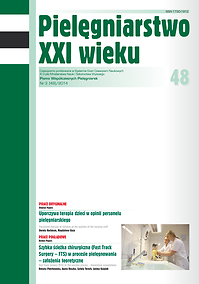Persistent therapy of children in the opinion of the nursing staff
Keywords:
persistent therapy, children, nursesAbstract
Introduction. Problem connected with the issue of persistent therapy arouses much ambiguity in the society because it concerns suffering connected with passing away and death. This issue is of great importance because of permanent development of medical therapies and various technical possibilities connected with prolonging life.
Aim. The aim of work is an analysis of nurse’s attitude towards persistent medical therapy of children.
Material and methods. The research was conducted in a group of one hundred and seven professionally active nurses using the method of diagnostic survey, and the author’s questionnaire .
Results. Vast majority of the personnel think that persistent therapy means prolonging life at any cost. The respondents accept the natural stage of passing away and death. Among the studied population, the quality of life has always been of priority importance in looking after and caring for terminally ill children. The whole group of respondents acknowledges at the same time that after withdrawal form persistent therapy they will look after children with professional medical care ensuring them good conditions of dying.
Conclusions. Regardless of the respondents’ professed belief or the religion practiced by them, they always treat with respect the sick or suffering person, and refer to life and death with respect as well . Each child is unique and individual human being and each case of an incurable disease is different, at the same time it is worthwhile to consider if obtaining a few days of life at the cost of incurably ill child’s extreme pain and suffering is desirable and justified
References
1. Bołoz W, Krajnik M. Konsensus Polskiej Grupy Roboczej ds. Problemów Etycznych Końca Życia. Definicja uporczywej terapii. Medycyna Paliatywna w Praktyce. 2008; (2), 3: 77-78.
2. Dangel T. Zaniechanie i wycofanie się z uporczywego leczenia podtrzymującego życie u dzieci. Polskie Towarzystwo Pediatryczne: Wytyczne dla lekarzy. Warszawa;2011, s. 254-264.
3. Korzeniewska-Eksterowicz A. Śmierć, umieranie, i choroba w różnych religiach [w:] Korzeniewska-Eksterowicz A, Młynarski W. (red.) Pediatryczna opieka paliatywna. Uniwersytet Medyczny w Łodzi; 2011, s. 489-505.
4. Dangel T. Opieka paliatywna nad dziećmi i młodzieżą [w:] Walden-Gałuszko K. (red.) Podstawy opieki paliatywnej. Warszawa: PZWL; 2006, s. 254 - 264.
5. Umiastowski J. Uporczywa terapia [w:] Muszla A.(red.) Encyklopedia bioetyki. Personalizm chrześcijański. Głos kościoła. Radom: Polwen; 2005, s.493-495.
6. Machinek M. Zagadnienie terapii uporczywej w świetle wypowiedzi Magisterium Kościoła. Medycyna paliatywna w praktyce. 2008; 2(3):91-98.
7. Tokarz W. Współczesne dylematy intensywnej terapii. Eutanazja – Anioł Śmierci czy Zbawienia. Anestezjologia i Ratownictwo. 2012; 6:16-23.
8. www.cbos.pl. Rogulska B. Aktualne problemy i wydarzenia”. Komunikat z badań Centrum Badań Opinii Społecznej. Warszawa 2013; badania przeprowadzono w 2012.
9. Szewczyk K. Wybrane zagadnienia etyczne w opiece paliatywnej nad dziećmi [w:] Korzeniewska-Eksterowicz A, Młynarski W. (red.) Pediatryczna opieka paliatywna. Uniwersytet Medyczny w Łodzi. 2011, s. 463-471.
10. Wrońska I. Szczegółowa etyka pielęgniarki [w:] Wrońska I, Mariański J. (red.) Etyka w pracy pielęgniarskiej. Podręcznik dla studentów pielęgniarskich studiów licencjackich. Lublin: Wydawnictwo Czelej; 2002:179-202.
Downloads
Published
Issue
Section
License
Copyright (c) 2014 Authors

This work is licensed under a Creative Commons Attribution 4.0 International License.




